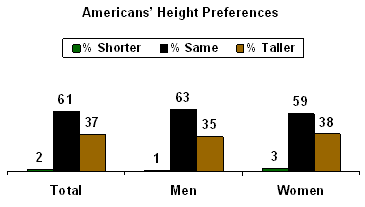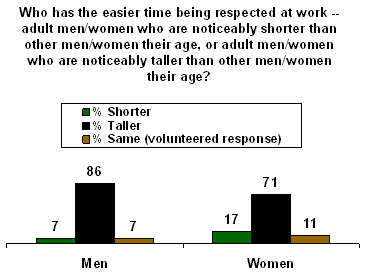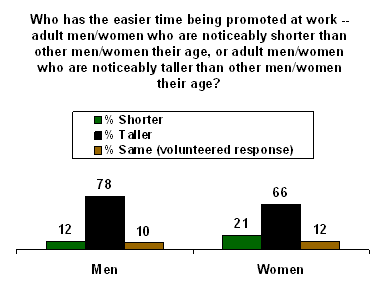GALLUP NEWS SERVICE
Does it really matter if someone is noticeably shorter or taller than someone else? Shorter people may be more likely to need help in reaching the highest shelves, and to feel submerged in a crowd, while taller folks may be more prone to bumping their heads and may feel decidedly more cramped in standard-sized airline seats. But what about things that really matter? What about feelings of self-confidence in social situations, or being respected -- or promoted -- at work?
The recently completed Gallup/Pfizer Survey of Opinions on the Social Impact of Stature measured perceptions of a random sample of Americans regarding the relative fortunes of adults who are noticeably shorter or taller than their peers. Although the survey did not directly assess whether taller or shorter people actually experience different outcomes, Gallup found ample evidence that Americans believe that one's stature has a decided effect on a variety of important dimensions.
Height Preferences
Before asking about the importance of height, Gallup asked the random sample of Americans whether they would prefer to be taller, shorter, or to remain at their present height. The majority of respondents (61%) say they would choose to stay as they are. Only a negligible number would like to be shorter (2%). But more than one in three American adults would like to be taller -- and the number is remarkably similar for men (35%) and women (38%).

How does this preference for being taller vary by the actual height of the respondent? To find out, Gallup divided the sample into thirds. For men, the bottom third of reported height was 5 feet 8 inches and under; the middle third, 5 feet 9 inches to 5 feet 11 inches; and the top third was 6 feet and taller. For women, the bottom third in reported height was 5 feet 3 inches and under; the middle third, 5 feet 4 inches to 5 feet 5 inches; and the tallest third was 5 feet 6 inches and taller.
Among the shortest third of men in the sample (those 5 feet 8 inches and under), 45% wish to be taller, while 54% say they would prefer to remain at their current height. But even among men who are 6 feet and taller (the tallest third of the male sample) 19% would like to be taller still, while 78% say they would prefer to stay at their current height if they had the opportunity to change it. Only 3% of this group would like to be shorter.
The parallel results for women are generally quite similar. Among the tallest third of women in the sample (those 5 feet 6 inches and taller), 20% say they would prefer to be still taller, while 74% would like to remain at their current height and only 7% wish to be shorter. At the other end of the spectrum, among the shortest third of women interviewed (those 5 feet 3 inches and under), 56% wish to be taller -- a higher number than the comparable percentage among men -- while 44% would prefer to remain at their current height.
Stature in the Workplace
Various reports over the years have argued that taller men have an advantage in the workplace, and some studies have argued that the taller candidate for U.S. president is almost always more likely to win (the most recent exception being John Kerry, who was taller than George W. Bush, yet lost the 2004 election).
Americans certainly tend to presume that height confers advantages in the workplace. Asked whether noticeably taller or noticeably shorter men have an easier time being respected at work, an overwhelming majority of Americans (86%) give the edge to taller men, while only 7% think shorter men have an easier time being respected, and another 7% volunteer that taller and shorter men have equal chances.
When the same question was asked about women, the results were similar, although not quite as lopsided: 71% think noticeably taller women have an easier time being respected at work, while 17% believe shorter women have the easier time, and 11% volunteer that neither group has an advantage. This view that taller women have an easier time being respected on the job than do shorter women was expressed by both men and women, but the perception was more prevalent among women (74% versus 15%) than among men (68% versus 20%).

Americans' belief that tall people have an advantage over short people is not limited to vague outcomes such as "respect" among coworkers. Gallup asked a parallel set of questions about the effect of height on one's chances of being promoted at work. The perceived advantages of height when it comes to one's chances for promotion are slightly less pronounced than they are in relation to respect, but the patterns are markedly similar. As with the respect question, the perception that increased height favorably affects promotion chances is less widespread for women than it is for men.

The Bottom Line
The data reviewed above are, after all, only opinions about whether shorter or taller people reap advantages or disadvantages from their stature, not proof that these dynamics exist in the workplace. But they do suggest that stature might belong among characteristics such as gender, age, and race that -- irrespective of their relevance -- can have a bearing on outcomes in the workplace and beyond. They reveal a remarkable degree of consensus among Americans that a pattern of thinking and behavior that could be given the name "heightism" exists. Beliefs cannot be taken as proof, but beliefs as broadly shared as the ones that are the focus of this survey beg to be taken seriously.
Survey Methods
These results are based on telephone interviews with a randomly selected national sample of 1,509 adults, aged 18 and older, conducted May 18-July 7, 2005. For results based on this sample, one can say with 95% confidence that the maximum error attributable to sampling and other random effects is ±3 percentage points. In addition to sampling error, question wording and practical difficulties in conducting surveys can introduce error or bias into the findings of public opinion polls.